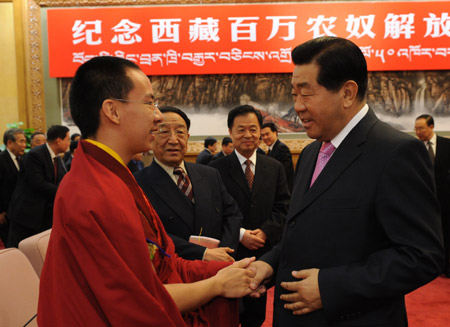The 11th Panchen Lama on Friday renewed a vow to commit his whole life to the unification of China and solidarity of all its ethnic groups, in a high-profile seminar in Beijing to celebrate Tibet's first Serfs' Emancipation Day, which falls on Saturday.
|

|
|
Jia Qinglin (R), chairman of the National Committee of the Chinese People's Political Consultative Conference (CPPCC), shakes hands with the 11th Panchen Lama Gyaincain Norbu during the symposium marking the 50th anniversary of serfs emancipation in Tibet held in Beijing, capital of China, on March 27, 2009. |
Tibet has witnessed a "historic leap" since the abolition of slavery 50 years ago, the Panchen Lama, born Gyaincain Norbu, told the seminar, held at the Great Hall of the People.
"The serfs' emancipation is wholly in line with Buddhist principles, and the pursuit for selflessness by Communists is also a basic Buddhist virtue," he said, winning a lasting round of applause from an audience that included China's top political advisor Jia Qinglin, Vice-Premier Hui Liangyu, State Councilors Ma Kai and Meng Jianzhu, as well as former Tibet officials and ex-serfs.
Meanwhile on Friday, a living Buddha from Tibet, Shingtsa Tenzinchodrak, said in Beijing that the attempt to pursue "Tibet's independence" by an extremely small number of people will never succeed because it lacks the Tibetan people's support.
"It (Tibet's independence) is day-dreaming," the 59-year-old said in a news briefing after his return from the United States and Canada where he led a five-member Tibetan delegation of the National People's Congress.
"Since the Democratic Reform in 1959, Tibetan people lead a far better life, thanks to the support from the central and other local governments," he said. "Having such a good life, do you think the people in Tibet will think of independence?"
In response to a question about why there are protests abroad against the rule of the central government in Tibet, Tenzinchodrak said many participants did not know the true picture in Tibet.
Some others, he said, were trying to mislead the Western public by deliberately spreading untrue information in order to malign China.
More than 1 million serfs were freed in Tibet in 1959, eight years into the region's peaceful liberation and shortly after a failed uprising of its feudalistic upper class.
Earlier, about 95 percent of Tibet's 1.14 million population were serfs, owning no more than 5 percent of the social resources. The local upper class, comprising only 5 percent of the region's population, ran a brutal, theocratic rule.
In January, Tibet's 382 legislators, mostly with a serf background, unanimously endorsed a bill, declaring March 28 as Serfs' Emancipation Day during the local people's congress' annual session in Lhasa.
Jia, chairman of the National Committee of the Chinese People's Political Consultative Conference, said the region's abolition of slavery carries symbolic ramifications as it "destroyed mankind's last serfdom stronghold".
The Panchen Lama said the 1959 riot, which led to the abolition of slavery and drove the Dalai Lama, Old Tibet's supreme leader, to a "government-in-exile" in India, was aimed at "opposing any social reform in Tibet and forever preserving theocratic feudal serfdom".
The riot "sought the interests of very few people and the lust for power of particular individuals", the 19-year-old added.
Dalai Lama, who earlier this month said China has "brought hell on Earth" to Tibet during the past 50 years, constantly insists that Old Tibet was "spiritually very advanced".
According to a white paper released by his office in Dharamshala, India, the serfs in Old Tibet "had a legal identity, often with documents stating their rights, and also had access to courts of law".
But that could not be further from the truth for Yeshe Lodro, a former serf-turned-servant to a senior lama in Lhasa's Drepung Monastery, who has told China Daily in a January interview in Tibet that his "biggest hope as a child was not to be beaten and scolded. But it was futile (even as a monk)."
Yeshe, born the same year as the Dalai Lama, arrived in Beijing for the first time on Thursday and shared recollections of his earlier years at the seminar on Friday.
"My mother told me that as serfs all that belonged to us were our shadows and footprints. The rest belonged to the lords. We'd just have to wait for a good fate in our next life," the 74-year-old recalled, with the Panchen Lama looking and listening calmly just meters away.
"This now is what I call a good life Beijing, the State leaders, the Panchen Lama. And a beautifully decorated house back home in Lhasa," Yeshe said after the seminar. "I'm happy. We all should be."
(China Daily March 28, 2009)